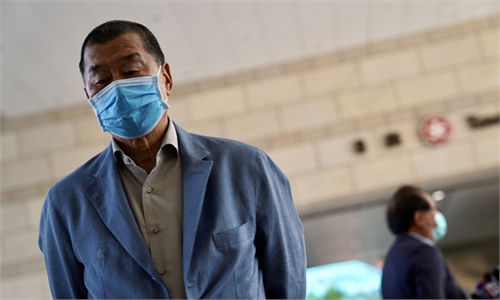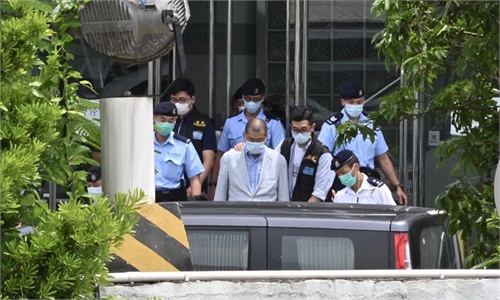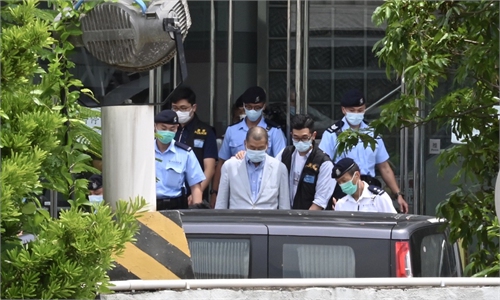Apple Daily can’t ‘represent’ free press as freedom of speech needs to comply with law: experts
Apple Daily can’t ‘represent’ free press
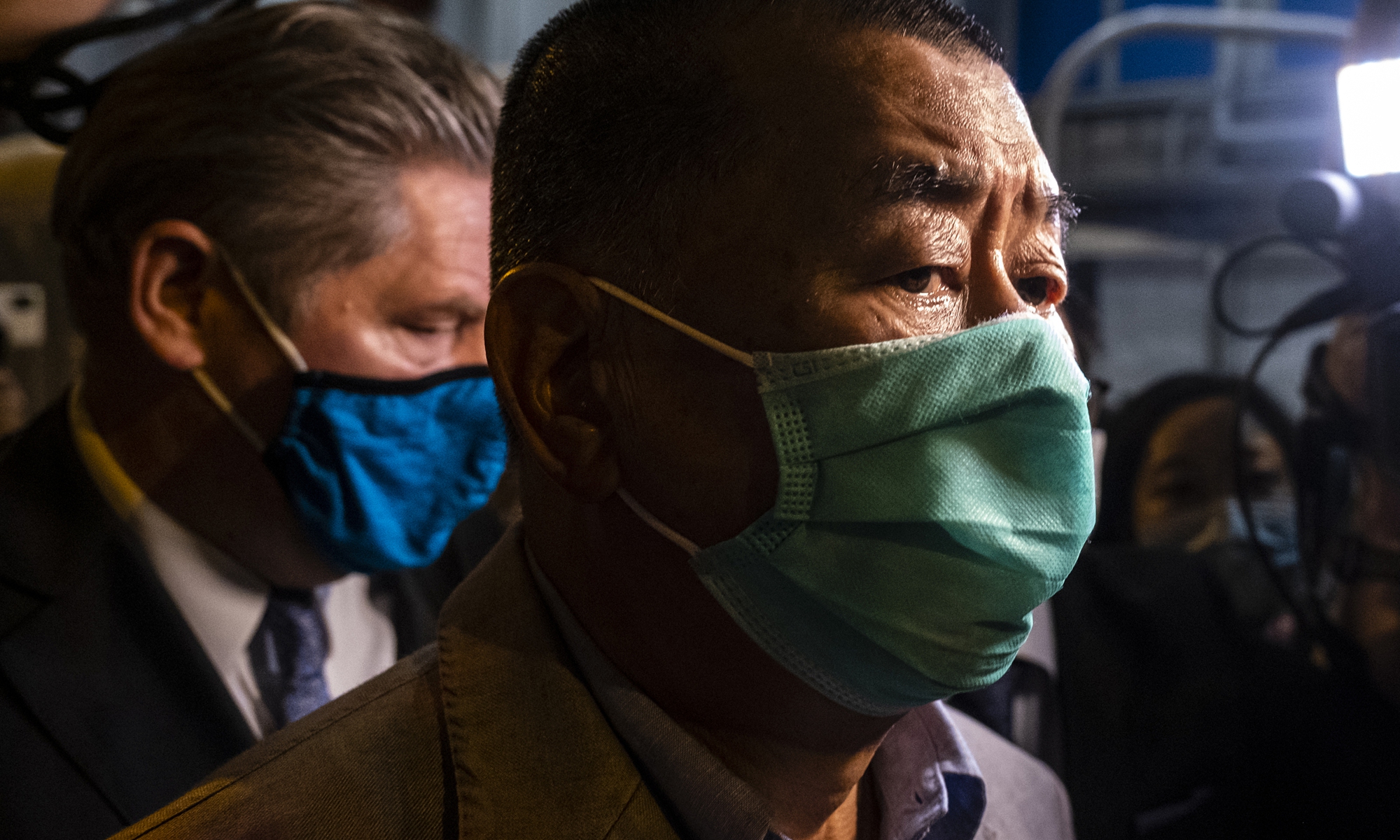
Jimmy Lai. Photo: VCG
When Western media considered the latest arrest of Apple Daily founder Jimmy Lai and the Hong Kong police's operation targeting its headquarters after the national security law for Hong Kong came into force as a "severe erosion of free press in Hong Kong," some ignored the essence of this matter, which has nothing to do with freedom of the press, and some have no idea what the fourth estate is about, observers said Thursday.Apple Daily, along with local internet-driven online news sites that have major audiences on social media, can't even be treated as real news organizations as the fourth estate is based on credibility while massive fake news and rumors circulated by those sites - including those constantly instigating hatred toward the Chinese mainland - have made certain "media groups" in Hong Kong a major support base of the anti-government political movement, according to local scholars and observers.
After Lai was granted bail, Apple Daily is prepared to seek a court injunction to bar the Hong Kong Police Force (HKPF) from examining materials seized during the operation, the paper said on Thursday, citing the basis that those documents include "journalistic material" which law enforcement is not authorized to read.
The arrests of Lai and other senior executives from Next Digital, the parent company of Apple Daily, for allegedly violating the national security law for Hong Kong have triggered collective criticism from some Western politicians, local anti-government groups and secessionist forces. They held the view that the latest arrests and police search spark fears of "a "demise of press freedoms."
Echoing such criticism, another news outlet RTHK pulled off a TV program with local secessionist Nathan Law, who is now on a wanted list for violating the national security law, local media reported on Thursday. In face of such moves, some local journalists in Hong Kong said they are concerned that the national security law deepens fears that freedom of speech, guaranteed by the Basic Law, is now in jeopardy.
Some western media outlets such as the New York Times, the Guardian and BBC also demonstrated choreographed efforts in helping fuel such fears by running stories with sensational headlines. However, Apple Daily's attempts of disguising itself as a real media outlet, which run eye-catching, seditious claims with bias to achieve political goals, can't fool the public, according to observers.
Such headlines were run at a time when some Hong Kong media outlets reportedly hyped up unverified information that a newly established national security unit under the Hong Kong Department of Immigration is now vetting foreign media visa applications, sending an ominous signal and even marking the end of free press in Hong Kong, some posts circulating on social media said.
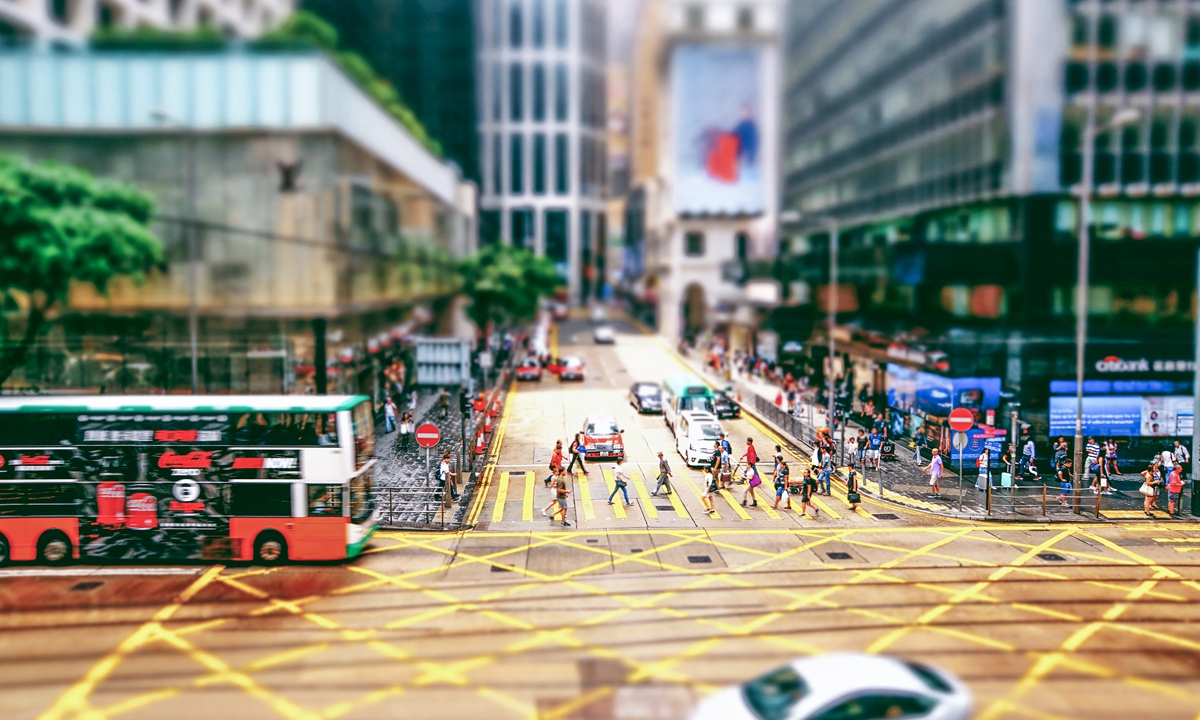
A bustling street in Hong Kong Photo: VCG
With boundaries
The HKPF is now investigating cases of relevant criminal acts endangering the national security, which has nothing to do with freedom of the press protected by the Basic Law, Kennedy Wong Ying-ho, solicitor of the Supreme Court of Hong Kong, told the Global Times on Thursday. "Apple Daily usually uses the excuse of 'free press,' but freedom of speech can't include the freedom to reject police investigations on relevant cases," he said.
Many Hong Kong people refer to Apple Daily as the "poisoned Apple" as the self-called media outlet frequently runs paparazzi-style fake news, keen on vulgar, entertainment-driven reporting.
During the social turmoil in 2019, Apple Daily repeatedly incited violence, encouraging "every youngster" to join in the rioting activities by coming up with long-format special coverage about black-clad rioters who vandalized shops and set fire at traffic junctions.
It also repeatedly attacked the HKPF by blatantly distorting news facts, consistently headlining "crazy policemen shooting citizens." When the HKPF arrested a man who rammed into police officers on duty riding a motorcycle with a secessionist slogan and caused injuries to three people in July 2020, Apple Daily portrayed the event as a "man being roughly stopped and subdued by police."
"It severely confuses right and wrong, brainwashing young people in Hong Kong and causing very negative impact on people's opinions toward the Hong Kong government and the mainland," Hung Kam-in, a member of the Kwun Tong District Council in Hong Kong, told the Global Times on Thursday.
Even during the COVID-19 epidemic, Apple Daily was working toward discrediting the mainland's work in epidemic prevention, while consistently referring to the tragic novel coronavirus infections as the "Wuhan pneumonia."
There's no absolute freedom of speech, as those provocative claims that instigate terrorism and violence won't be tolerated in other countries, "and no country would allow free press to endanger its own national security," Hung said.
Robert Ovadia, an Australian reporter who helped Hong Kong actress Celine Ma Tai-lo in October 2019 after she was brutally attacked and beaten by black-clad rioters, said in a recent Tweet that "it's convenient to paint Lai's arrest as a dark day for 'press freedom.'"
"Lai's Apple Daily destroyed Hong Kong's peace and stability with deliberate falsehoods to warp perceptions. It is self-serving propaganda, no more, and certainly no champion of honest journalism or freedom," he said.
Purna Basnet, chief editor of a Nepali online portal, has been based in Hong Kong as a correspondent for eight years. He believes that press freedom is vital to Hong Kong's economy and the democratic political exercise under the "one country, two systems" principle will not change because of the national security law.
"Now we have to understand that Hong Kong has a national security law, and all of Hong Kong residents are under this law," he told the Global Times on Thursday.
He said Lai was arrested over alleged collusion with foreign forces, not because of his media business.
"I don't think that the newly enacted national security law will control Hong Kong's press freedom," he said, noting that the press is free to report the truth, but only within the boundaries of what is not endangering national security.
While Hong Kong has become a major battleground of the China-US rivalry, local media has also been divided and dominated by different ideologies, which may face more intense competition in the future, some observers said.
"To prevent fake news and hyped rumors that manipulate people's opinions, we should reevaluate the so-called free press as there's no absolute freedom," Hung said.
Some legal experts also suggested that Hong Kong authorities should soon come up with the formulation of an anti-fake news law. Lack of such a law leaves room for some local reporters to exaggerate their so-called fourth estate to defend anything they have done.
"I think Hong Kong should accelerate the formulation of an anti-fake news law and internet security law, as people need to be responsible for their claims, especially verbal abuse and attacks, which are commonly seen on online platforms here," Wong said.


